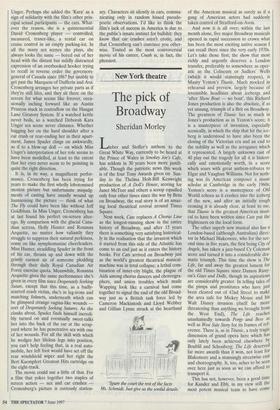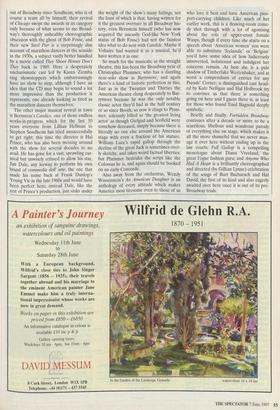New York theatre
The pick of Broadway
Sheridan Morley
L*eber and Stoller's anthem to the Great White Way, currently to be heard at the Prince of Wales in Smokey Joe's Cafe, has seldom in 30 years been more justifi- able. Though the patriotic news this week is of the four Tony Awards given on Sun- day to the Thelma Holt-Bill Kenwright production of A Doll's House, scoring for Janet McTeer and others a scoop equalled only four other times since the war by Brits on Broadway, the real story is of an amaz- ing local theatrical revival around Times Square.
Next week, Cats replaces A Chorus Line as the longest-running show in the entire history of Broadway, and after 15 years there is something very satisfying historical- ly in the realisation that the invasion which it started from this side of the Atlantic has come to an end just as it enters the history books. For Cats arrived on Broadway just as the world's greatest theatrical musical- machine was in total collapse; a lethal com- bination of inner-city blight, the plague of Aids among chorus dancers and choreogra- phers, and union troubles which made Wapping look like a carnival had come together to signal the end of the old Broad- way just as a British task force led by Cameron Mackintosh and Lloyd Webber and Gillian Lynne struck at the heartland 'Spare the court the rest of the facts Ms. Schmidt. Just give us the sordid details.' of the American musical as surely as if a gang of American actors had suddenly taken control of Stratford-on-Avon.
And now it is all over; within the last month alone, five major Broadway musicals opened in rapid succession to crown what has been the most exciting native season I can recall there since the very early 1970s. Let's take those first; the show that most richly and urgently deserves a London transfer, preferably to somewhere as oper- atic as the Coliseum or Sadlers' Wells (which it would stunningly reopen), is Maury Yeston's Titanic. Much mocked in rehearsal and preview, largely because of irresistible headlines about icebergs and 'after Show Boat — no boat', this Richard Jones production is also the absolute, if as yet unsung, triumph of a Brit on Broadway. The greatness of Titanic lies as much in Jones's production as in Yeston's score; it is a masterpiece of invention, especially scenically, in which the ship that hit the ice- berg is understood to have also been the closing of the Victorian era and an end to the nobility as well as the arrogance which it represented. A largely unknown cast of 40 play out the tragedy for all it is histori- cally and emotionally worth, in a score which soars with great anthem-tributes to Elgar and Vaughan Williams. Not for noth- ing was its American composer a music scholar at Cambridge in the early 1960s; Yeston's score is a masterpiece of Old World echoes as it crashes into the iceberg of the new, and after an initially rough crossing it is already clear, at least to me, that Titanic is the greatest American musi- cal to have been written since Cats put the frighteners on the local form.
The other superb new musical also has a London-based (although Australian) direc- tor in Michael Blakemore, who for the sec- ond time in five years, the first being City of Angels, has taken a jazz-based Cy Coleman score and turned it into a considerable dra- matic triumph. This time the show is The Life, far and away the greatest lament for the old Times Square since Damon Runy- on's Guys and Dolls, though its aspirations are considerably greater. In telling tales of the pimps and prostitutes who have just been cleared out of 42nd Street to make the area safe for Mickey Mouse and his Walt Disney invasion (itself far more threatening than anything we brought from the West End), The Life reaches unashamedly towards Pow/ and Bess as well as West Side Story for its frames of ref- erence. There is, as in Titanic, a truly tragic dimension of grand opera here which has only lately been achieved elsewhere by Boublil and Schonberg; The Life deserved far more awards than it won, not least for Blakemore and a stunningly streetwise cast and choreography. It, too, aches to be seen over here just as soon as we can afford to transport it. This has not, however, been a good time for Kander and Ebb, in my view still the most potent musical team to have come out of Broadway since Sondheim, who is of course a team all by himself; their revival of Chicago swept the awards in its category only because of what seems to me Broad- way's thoroughly unhealthy choreographic obsession with the ghost of Bob Fosse, and their new Steel Pier is a surprisingly dim account of marathon dancers at the seaside in the 1930s, a subject vastly better handled by a movie called They Shoot Horses Don't They back in 1969. Here a desperately uncharismatic cast led by Karen Ziemba sing showstoppers which embarrassingly have no show to stop, although I have an idea that the CD may begin to sound a lot more impressive than the production it represents, one already looking as tired as the marathon dancers themselves.
The other major musical revival in town is Bernstein's Candice, one of those endless works-in-progress which for the last 50 years everyone from Lillian Hellman to Stephen Sondheim has tried unsuccessfully to get right; this time the director is Hal Prince, who has also been messing around with the show for several decades to no avail. He has gone for a vast, sprawling car- nival but unwisely refused to allow his star, Jim Dale, any leeway to perform his own brand of commedia dell' arte, the one that made his name back at Frank Dunlop's Young Vic in the late 1960s and would have been perfect here; instead Dale, like the rest of Prince's production, just sinks under the weight of the show's many failings, not the least of which is that, having written for it the greatest overture in all Broadway his- tory, even Bernstein himself (who has now acquired the uneasily God-like New York status of Bob Fosse) had not the faintest idea what to do next with Candide. Maybe if Voltaire had wanted it as a musical, he'd have written it as one.
So much for the musicals; in the straight theatre, this has been the Broadway year of Christopher Plummer, who has a dazzling near-solo show in Banymore, and again there's a kind of historic perfection in this. Just as in the Twenties and Thirties the American theatre clung desperately to Bar- rymore because he was the only notable classic actor they'd had in the half century or so since Booth, so now it clings to Plum- mer, solemnly billed as 'the greatest living actor' as though Gielgud and Scofield were somehow deceased, simply because there is literally no one else around the American stage with even a fraction of his stature. William Luce's rapid gallop through the decline of the great Jack is sometimes over- ly sketchy, and takes weird factual liberties; but Plummer bestrides the script like the Colossus he is, and again should be booked on an early Concorde. Also away from the orchestras, Wendy Wasserstein's An American Daughter is an anthology of every attitude which makes America most tiresome even to those of us who love it best and have American pass- port-carrying children. Like much of her earlier work, this is a drawing-room come- dy shot through with a lot of agonising about the role of upper-crust female Wasps, though if every time she starts on a speech about 'American women' you were able to substitute 'Icelandic' or 'Belgian' you'd have some idea of how ludicrously introverted, isolationist and indulgent her concerns remain. At best she is a pale shadow of Timberlake Wertenbaker, and at worst a compendium of entries for any Pseuds' Corner; a distinguished cast head- ed by Kate Nelligan and Hal Holbrook try to convince us that there is something going on here and I guess there is, at least for those who found Enid Bagnold deeply symbolic.
Briefly and finally, Forbidden Broadway continues after a decade or more to be a scurrilous, libellous and wondrous parody of everything else on stage, which makes it all the more shameful that we never man- age it over here without ending up in the law courts; Full Gallop is a compelling monologue about Diana Vreeland, the great Vogue fashion guru; and Anyone Who Had A Heart is a brilliantly choreographed and directed (by Gillian Lynne) celebration of the songs of Burt Bacharach and Hal David, the first of its kind and also eagerly awaited over here once it is out of its pre- Broadway trials.











































































 Previous page
Previous page